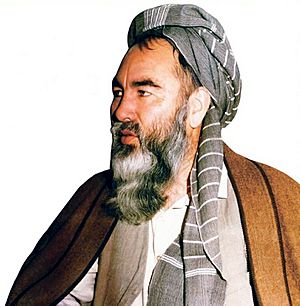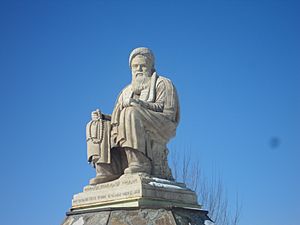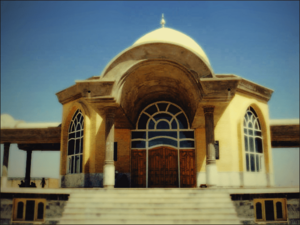Abdul Ali Mazari facts for kids
Quick facts for kids
Ustad
Abdul Ali Mazari
استاد عبدالعلی مزاری |
|
|---|---|
 |
|
| Leader of Hezbe Wahdat | |
| In office 1989 – 13 March 1995 |
|
| Personal details | |
| Born | 1946 Charkent, Balkh province, Afghanistan |
| Died | 13 March 1995 (aged 48–49) Ghazni city, Ghazni province, Afghanistan |
| Political party | Hezbe Wahdat |
| Occupation | Mujahideen commander; politician |
| Awards | Mim Hea Mim peace award |
| Ethnicity | Hazara |
| Nickname | Baba Mazari (Dari: بابه مزاری) |
Abdul Ali Mazari (born in 1946, died March 13, 1995) was an important Afghan politician. He belonged to the Hazara ethnic group. Mazari led the Hezbe Wahdat party during and after the Soviet–Afghan War.
He strongly believed that Afghanistan needed a federal system of government. This meant each ethnic group would have special rights. They could also govern their own land and people. Mazari supported equal representation for all ethnic groups in Afghanistan. He especially championed the Hazaras, who felt they were not treated fairly. In 2016, the Afghan government officially named him ‘Martyr Of National Unity’.
Contents
Early Life and Education
Abdul Ali Mazari was born in 1946 in the Charkent district. This area is part of Balkh province in northern Afghanistan. He started learning about theology at a local school in his hometown.
Later, he continued his studies in bigger cities. He went to Mazar-i-Sharif in Afghanistan. Then, he traveled to Qom in Iran and Najaf in Iraq. These cities are famous centers for religious learning.
A Leader in Afghanistan's Conflict
Fighting for Freedom
When the Soviet–Afghan War began, Mazari returned to Afghanistan. He quickly became a key figure in the mujahideen resistance movement. This group fought against the Soviet-backed forces. During these difficult years, Mazari faced great personal loss.
He lost his younger brother, Mohammed Sultan, in a battle. His sister and other family members also died in the resistance. His uncle, Mohammad Ja'afar, and his cousin, Mohammad Afzal, were captured and killed. His father, Haji Khudadad, and another brother, Haji Mohammad Nabi, also died in the war.
Forming the Unity Party
Abdul Ali Mazari was one of the people who helped start the Hezbe Wahdat. This name means "Unity Party." He became the first leader of its Central Committee. Later, he was chosen as the Secretary General of the party.
Mazari also helped create the Jonbesh-e Shamal, or "Northern Movement." This movement brought together many important military groups. Their combined efforts led to a major change in government. It helped bring down the Communist rule in Kabul.
Working Towards Peace
After the fall of Kabul in 1992, Afghan political groups tried to make peace. They signed the Peshawar Accords. This agreement created the Islamic State of Afghanistan. It also set up an interim government to rule for a short time. The plan was to hold general elections later.
The Hezbe Wahdat party, led by Mazari, joined this new government. They held some positions. However, conflicts soon started between different groups. The Hazara Hezbe Wahdat and the Pashtun Ittihad-i Islami began to clash.
Leaders like Ahmad Shah Massoud tried to help them make peace. But the fighting continued on and off. Different groups received support from other countries. This made it even harder to achieve lasting peace in Afghanistan. Mazari's goal was always to ensure all ethnic groups, especially the Hazaras, had a fair voice.
His Final Days

On March 12, 1995, the Taliban asked to meet with Mazari. He went with a group from his party to Chahar Asiab, near Kabul. When they arrived, the group was captured.
The next day, Mazari was killed. His body was found in a district of Ghazni. The Taliban stated that Mazari had attacked their guards while being flown to Kandahar.
Mazari's followers showed great respect for him after his death. They carried his body on foot from Ghazni all the way to Mazar-i-Sharif in the north. This long journey took over forty days, through heavy snow. Hundreds of thousands of people attended his funeral in Mazar-i Sharif. In 2016, President Ashraf Ghani officially recognized Abdul Ali Mazari as a Martyr for National Unity of Afghanistan.
See also
- List of Hazara people
- Abdul Khaliq Hazara (assassin)
- Mehdi Mujahid
 | Shirley Ann Jackson |
 | Garett Morgan |
 | J. Ernest Wilkins Jr. |
 | Elijah McCoy |


